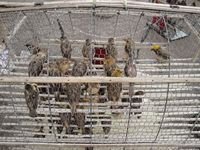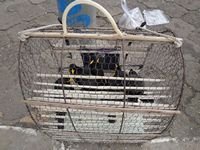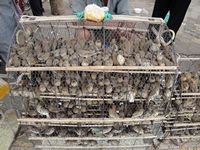had a disturbing visit to a local market temple area here in the city, it seems that some Buddhists believe that if they release a wild bird it means they will become a better person.
this has led to a trade in wild birds -see photos- unfortunatley they are all crammed in cages and left in the heat of the sun.
tree sparrows- common here- , munias, weavers and mynas were all available.
some of the birds are captured up in the provinces- not sure to what extent this happens in the markets up country, but Ive seen reports of some of the globally threatened species being offered as meat in the markets.
how sad a bird has to be captured just so it can be set free again.
any birders in the rest of Asia witnessing the same thing?
cheers
Nigel
freethecagedbirds.blogspot.com




this has led to a trade in wild birds -see photos- unfortunatley they are all crammed in cages and left in the heat of the sun.
tree sparrows- common here- , munias, weavers and mynas were all available.
some of the birds are captured up in the provinces- not sure to what extent this happens in the markets up country, but Ive seen reports of some of the globally threatened species being offered as meat in the markets.
how sad a bird has to be captured just so it can be set free again.
any birders in the rest of Asia witnessing the same thing?
cheers
Nigel
freethecagedbirds.blogspot.com








